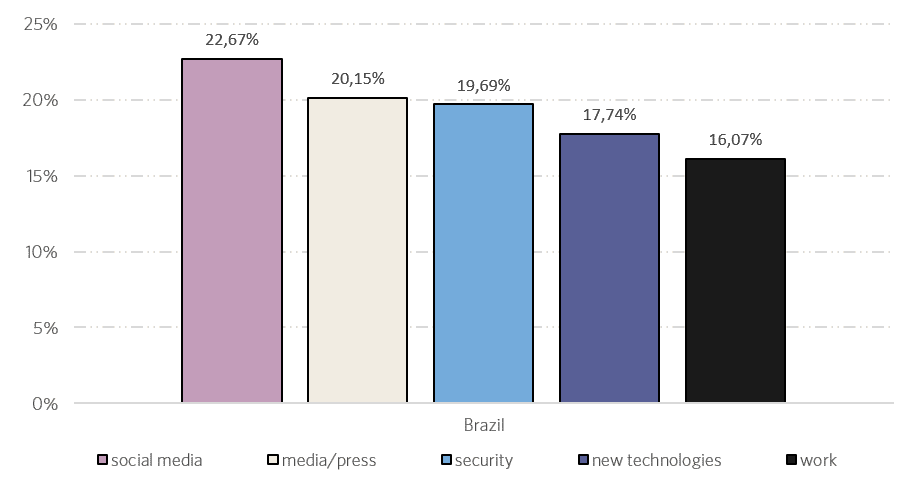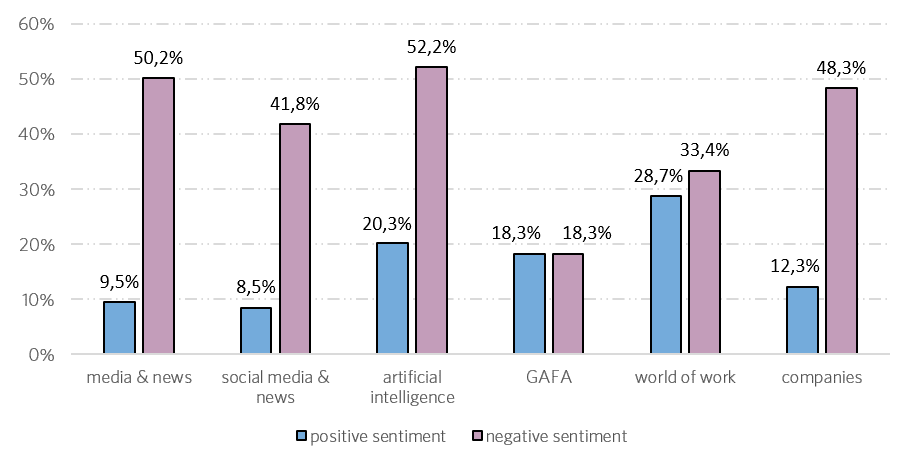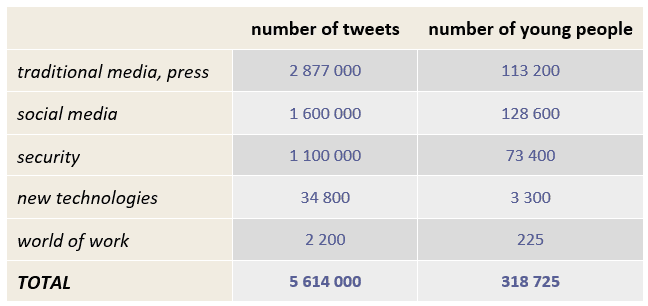This analysis gathers and delves deeper into the Brazilian data presented in the EYES 2021 (Emergy Youth Early Signs) report on the emerging concerns of 18- to 24-year-olds of 5 nationalities: Brazilian, Chinese, American, French, and South African.
The EYES 2021 report published in February 2022 sought to analyse the perceptions of 18- to 24-year-olds from the five countries in which SKEMA Business School operates, on 5 political issues prioritised by young people in that age group: traditional media and the press, social media, security, new technologies, and the world of work. The report is the fruit of qualitative interviews conducted with 36 SKEMA students (2 of which were Brazilian), and of social listening carried out on the Twitter platform between July 2020 and June 2021. The detailed methodology for this work is annexed to the EYES 2021 report.
Young Brazilians Are Very Active on Twitter
Twitter is an especially popular social network among Brazilians. With 17,250,000 users in April 2021 according to Statista, they make up the 5th largest population of Twitter users worldwide. Young Brazilians are particularly well represented on the social media platform. Of the 5 nationalities included in the EYES 2021 study (Brazilian, American, Chinese, French, South African), this one is the leader in terms of the participation of 18- to 24-year-olds in the national conversation. Across our 5 selected themes, 1 in 5 of the Brazilian users who tweeted an opinion belongs to this age group.

Positive and Negative Perceptions
Sentiment analysis technology is not yet fully stabilised methodologically. However, we felt it interesting to mention the sentiments identified among the young subjects of the study, particularly when they confirm the wording of the tweets. Of the five themes analysed, traditional media and artificial intelligence are those where the most mistrust is detected among young Brazilians.

Young Brazilians & News: Mistrust of Traditional Media but also of Social Media
Traditional media/press and social media are the two themes that sparked the most reactions among young Brazilians, both in terms of the number of tweets posted and the number of tweet authors.

The views of 18- to 24-year-olds on traditional media are particularly negative. More than half of the tweets containing the words ‘media’ and ‘news’ have a negative connotation. During the period studied, Brazil’s president, Jair Bolsonaro, had strained relations with the traditional media outlets and criticised their partiality. Whether as a consequence of this or not, in Brazil we see a clear trend among young people toward the denigration of traditional news sources. In fact, several of the most popular hashtags for this theme refer to the president: #BolsonaroTemRazao (Bolsonaro is right, 6th), #BolsonaroOrgulhoDoBrasil (Bolsonaro pride of Brazil, 8th), and #BolsonaroAte2026 (Bolsonaro until 2026, 10th). The mistrust of traditional media extends as far as singularly attacking the leading media outlets. With 3,600 results, #GloboLixo (Globo garbage) is the 5th most popular hashtag for the traditional media theme. The Globo Group is the largest media conglomerate in Brazil and Latin America.
Social media appears in a scarcely more favourable light, since nearly 42% of tweets containing the terms ‘social media’ and ‘news’ are also negative. The expression ‘fake news’ is widely used across both themes. In the traditional media/press and social media categories, it is the second most recurring expression from our selection of keywords (see the annex to the EYES 2021 report). While young Brazilians are aware of the danger of spreading fake news, they do not seem favourable to a tighter control over publications. To protest against censorship, #SilenceDay, the 8th most popular hashtag in the social media theme, called on web users to abstain from posting on social media for 24 hours.
Brazilian youths take a keen interest in changes to social media regulation. The Internet Freedom, Responsibility and Transparency Bill is widely debated under the hashtag #PL2630Nao (no to Bill 2630), the 6th most widely used hashtag for this theme, with 1,400 tweets. The Bill, which was being read in Parliament at the time, was aimed at reducing disinformation. It was widely criticized, as NGOs (Amnesty International and Human Rights Watch, for example) but also government circles and the social media giants themselves perceived it as encroaching on freedom of speech. However, the combination of the terms ‘state/government’ and ‘social media’ brings up just 29,000 tweets, so 1.8% of tweets for this theme. By comparison, the association of the terms ‘state/government’ and ‘traditional media/press’ can be found in 181,300 tweets, i.e. 6.3% of the theme.
Social Media & Well-Being: What is the Right Balance?
A Brazilian student surveyed during the qualitative interviews at the beginning of the study mentioned the psychological pressure young people can fall prey to on social media. In his view, the pressure on social media to keep up appearances has a negative impact on mental health and well-being. He also felt that these platforms promote “wealth” as the key goal in life. He explained that younger people’s obsession with money was exacerbated by influencers who deliberately “glamourised” their everyday life to obtain more comments, clicks, likes and shares. According to the two Brazilian students interviewed, the boundaries between virtual life and real life become blurred: the virtual identity seems to become more important. They wondered how to break this obsession with appearances and superficiality. The students also questioned the role played by social media in the development of adolescents: are these platforms actually the instigators of the very low levels of self-confidence some young people suffer from and which can lead to severe depression?
Impact of Covid-19 on the Health Security of Young People
In the early days of the pandemic, social media was flooded with posts and comments about health security. On Twitter, the conversation appeared in the context of disagreement over the Brazilian government’s management of the pandemic: #Covid-19 and #29MForaBolsonaro (in reference to a nationwide protest held on 29 May 2021) were the 8th and 10th hashtags more commonly associated with security. Using the hashtag #AdiaENEM (“postpone ENEM”), the 18 to 24 age group mobilised massively on the question of going ahead with ENEM, the national high school exam. This is the 2nd most common hashtag for the theme.
Physical Security
Within the work groups composed of SKEMA students, the question of physical security was especially raised by the Brazilians. On Twitter, violence against women is a topic of great concern. #Justicapormariferrer, in reference to a young woman victim of rape, is the 6th most widely used hashtag for the security theme.
It is interesting to mention the reach the Black Lives Matter movement had in Brazil. Revived in May 2020 following the killing of George Floyd in Minneapolis, #BlackLivesMatter ranked as one of the leading hashtags for the theme in the United States and became number 1 for the security theme in Brazil between May and June 2020, with close to 25,000 results. There were 10,000 occurrences of its Portuguese translation, #VidemNegrasImportan. Any mention then disappeared from the rankings during our social listening period (1 July 2020 – 31 June 2021).
During the qualitative interviews, SKEMA’s Brazilian students wondered what the role of the state was in resolving security issues. In particular, they invited policymakers to identify the root causes in order to better adapt their solutions: is police the answer to security issues? Or is education the answer?
Political Security
The Brazilian government’s controversial use of the National Security Law also made a great deal of noise on social media. Indeed, in March 2021, the government invoked this law to have the YouTuber Felipe Neto arrested after he accused the president of genocide. Several hashtags are associated with these conversations: #BolsonaroGenocida (Bolsonaro genocide, 5th place), #ForaBolsonaro (Get out, Bolsonaro, 7th place), #DitaduraNuncaMais (Dictatorship never again, 14th), #TodosContraFelipeNeto (All against Felipe Neto, 17th), and #ForaBolsonaroGenocida (33th).
Brazilian youths are particularly interested in discussions about freedom and security. The combination of these two words represents 161,500 tweets, so nearly 15% of all tweets discussing security. In comparison, conversations about the state and the government make up barely 6% of the theme.
Finally, the security of voting procedures appears in 9th place for this theme with the hashtag #VotoImpressoAuditavelJa (verifiable printed votes now), since debates about the reliability of electronic voting machines were rekindled in 2021.
Security in a Connected World
During the preliminary interviews conducted for the study, Brazilian students wondered about the capacity of societies to develop their understanding of cybersecurity at the same speed as technological advances. They pointed out the billions of dollars their country loses each year as a result of cybercrime. Cybercrime is a major problem in Brazil. The country ranks second worldwide for financial loss resulting from cybercrime, with a figure of 26 billion dollars in 2019 (Comparitech study).
On the other hand, the students had just as many questions about the impact of the centralised state regulation of online activities. Do initiatives such as the Great Firewall in China truly enable web users to feel safer online? Questions regarding the balance between freedom and security reappeared here also.
Young Brazilians Distrusful of Artificial Intelligence
Young Brazilians speak relatively little about artificial intelligence, which gathers a total of around 32,000 tweets (from September 2020 to October 2021), a great deal less than the 1.1 million about security, 1.6 million about social media, and 2.8 millions about traditional media and the press. Reactions to AI are unquestionably negative, more so than for any of the other four nationalities covered in the study. 52.2% of the tweets containing the expression ‘artificial intelligence’ are negative, versus 20.3% of positive tweets.
Big Tech Absent from the Conversations
GAFA (Google, Apple, Facebook, Amazon – also known as ‘the Big Four’, ‘Big Tech’, ‘the Tech Giants’) appeared as a minor topic of conversation among young Brazilians. Between September 2020 and October 2021, they were only mentioned in around 1,000 tweets. Sentiment regarding the Tech Giants is mixed, with as many negative tweets as positive ones. There is no clear trend in either direction for this theme.
A Rather Negative View of the Corporate World
The world of work was also less mentioned by young Brazilians, with just 2,200 tweets posted by 225 youths. However, in these tweets there is a clear distrust of companies: more than half of the tweets containing the word ‘companies’ had a negative connotation, while just 12% were positive. The same trend can be found among French, American (from the USA) and South African youths. We provide an analysis of this in Youth at Work: Distrust of the Corporate World and Political Demands.


